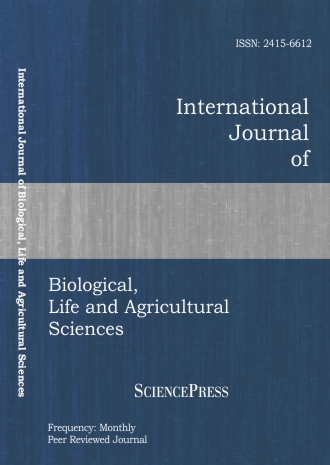
Scholarly
Volume:4, Issue: 5, 2010 Page No: 225 - 227
International Journal of Biological, Life and Agricultural Sciences
ISSN: 2415-6612
4462 Downloads
Reproduction Performance of Etawah Cross Bred Goats in Estrus Synchronization by Controlled Internal Drug Release Implant and Pgf2α Continued by Artificial Insemination
The estrus female Etawah cross bred goats were synchronized estrus by controlled internal drug release (CIDR) implants for 10 days combined with PGF2α injection, and continued by artificial insemination (AI) within the hours of 24 period. Vaginal epithelium was taken to determine estrus cycle of the goats without estrus synchronization. The estrus responds (the puffy of vulva and vaginal pH) and percentage of pregnancy were investigated. The data were analyzed descriptively and Independent Sample T-Test. The results showed that the puffy of vulva and vaginal pH were significantly different in synchronized estrus goats and control goats (2.18 ± 0.33 cm vs. 1.20 ± 0.16 cm and 8.55 ± 0.63 vs. 8.22 ± 0.22). Percentage of pregnancy was higher in synchronized estrus goats (73.33%) than in control (53.3%). Estrus synchronization by using CIDR implants and PGF2, continued by AI was effective to improve reproduction performance of Etawah cross bred goats.
References:
[1] M. O. Ezekwe and J. Lovin, "Aseasonal reproductive performance of